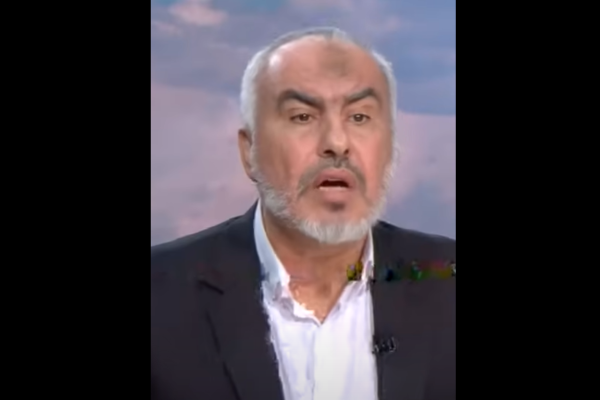‘Israel is a country that has no place on our land, says Hamas leader Ghazi Hamad.
By Rachel O’Donoghue, Algemeiner
Not long after Hamas terrorists invaded southern Israel to rape and massacre scores of civilians — then dragging hundreds of hostages back to the Gaza Strip — senior Hamas leader Ghazi Hamad spoke with Lebanese news outlet LBCI.
During the interview, Hamad said: “Israel is a country that has no place on our land,” explaining that it was the job of Hamas to “remove that country.”
Questioned about the October 7 atrocities, Hamad responded:
We must teach Israel a lesson, and we will do this again and again.
The Al-Aqsa Flood is just the first time, and there will be a second, a third, a fourth, because we have the determination, the resolve, and the capabilities to fight … Nobody should blame us. On October 7, October 10, October one million — everything we do is justified.
There can be no doubt about Hamas and its goals: the terrorist group wants to destroy Israel and every single one of its citizens.
Hamas’ leaders have not hidden the fact that they believe the October 7 massacre was justified, and that they will try to replicate the horror over and over again.
Likewise, before October 7, Hamas never masked its genocidal aims, having been founded on a charter that swears Islam will “obliterate” Israel.
Why, then, do media outlets keep presenting Hamas as a viable partner for peace, while implicitly suggesting that the terrorist group’s extremism is, at least in part, a response to the hawkish right-wing Israeli government that was formed in 2022?
In a recent op-ed in The Guardian, Peter Hain, a former UK Middle East minister, argues that while Israel is damaging Hamas militarily, it cannot hope to totally destroy it because “Hamas is a movement and an ideology that, in many respects, Netanyahu’s extremism helped to promote.”
He adds: “Rightwing Israeli governments have thwarted serious negotiations with Palestine’s more ‘moderate’ party, the late Yasser Arafat’s Fatah, since the Camp David summit in 2000 – more than 20 years ago. They have also consistently oppressed Gaza residents, imposing a near-constant state of siege. Is it really surprising that many Palestinians turned in desperation to an extremist alternative in Hamas?”
Several points must be made in response.
1. The claim that Prime Minister Netanyahu’s “extremism” helped promote Hamas is not just inaccurate, but grossly offensive.
Whatever one’s view on Netanyahu, he is in no way responsible for furthering Hamas’ warped ideology. Not only does Hamas long predate Netanyahu, but — as is clear from Ghazi Hamad’s comments — it has vowed to carry on attacking Israel regardless of who is in the government.
2. Hain is palpably wrong to suggest that Palestinians in Gaza “turned in desperation to an extremist alternative in Hamas” following the failure at Camp David, and what he described as a “near-constant state of siege.”
The blockade on the Gaza Strip, which Egypt also maintains, began in 2007 and came after Palestinians voted for Hamas and after it fought an internecine war against rivals Fatah, who were expelled from the territory.
3. It is a lie that successive right-wing Israeli governments have “thwarted serious negotiations” since Camp David. There have been numerous attempts by Israel to restart peace talks since 2000, and Netanyahu himself acknowledged in 2011 that Israel would have to give up land to create “genuine peace.”
Hain goes on to state that finding a peaceful solution will have to include Hamas at the negotiating table, arguing that discussions that only involve the discredited Palestinian Authority will be doomed to failure.
And here is the problem — Hain, like many other commentators, is wrong to believe that Hamas could ever be a peace-loving neighbor of Israel.
Hamas has sworn that it will not stop attacking until Israel and all Jews are dead.
Why do people like Peter Hain believe Hamas will suddenly abandon its genocidal pursuit if a less right-wing Israeli government is in power?
